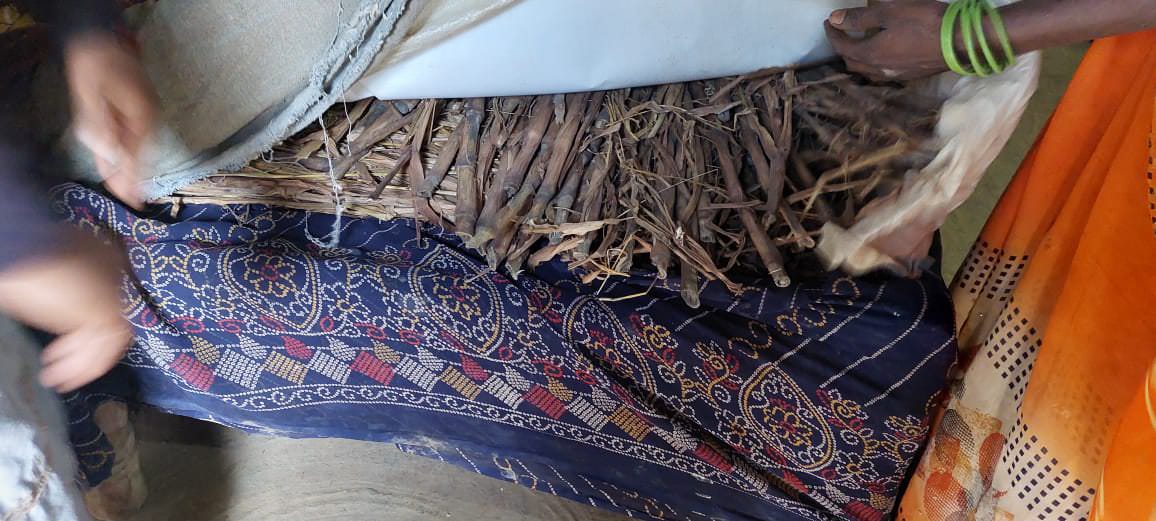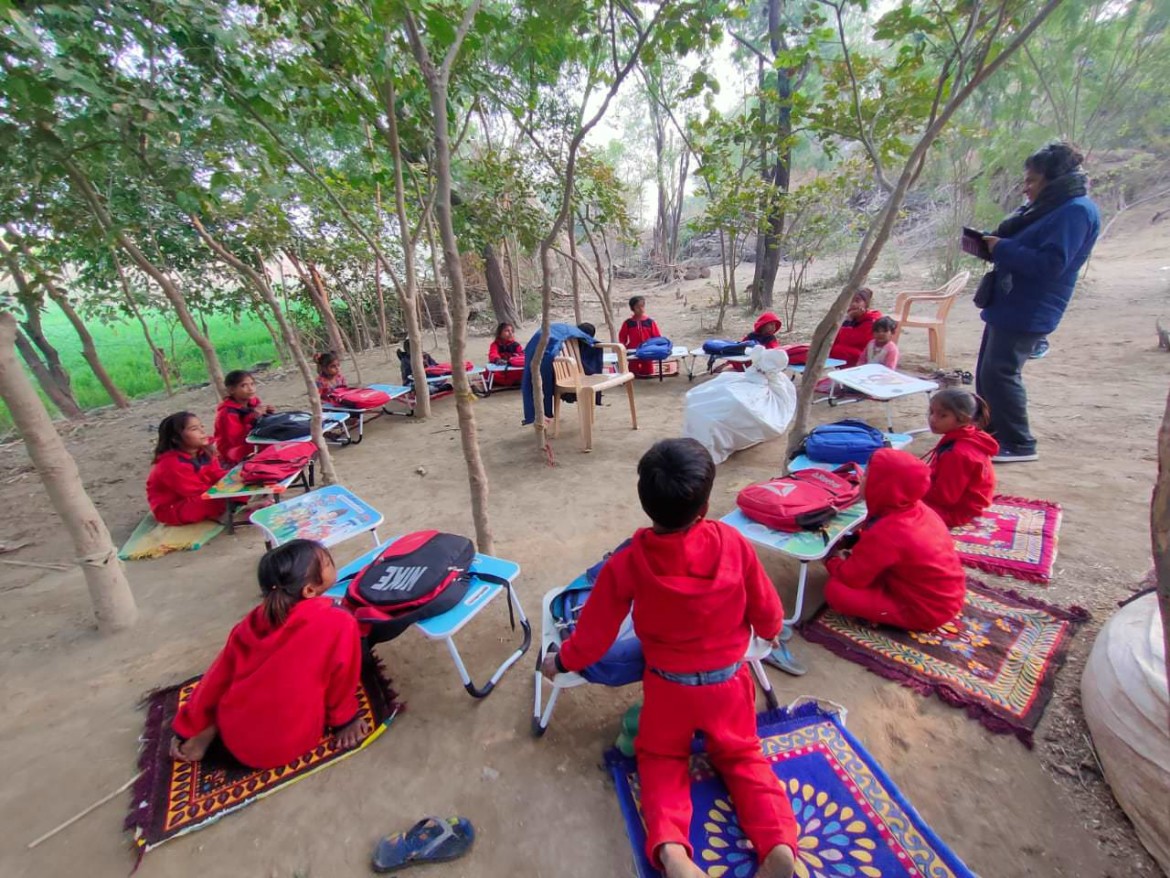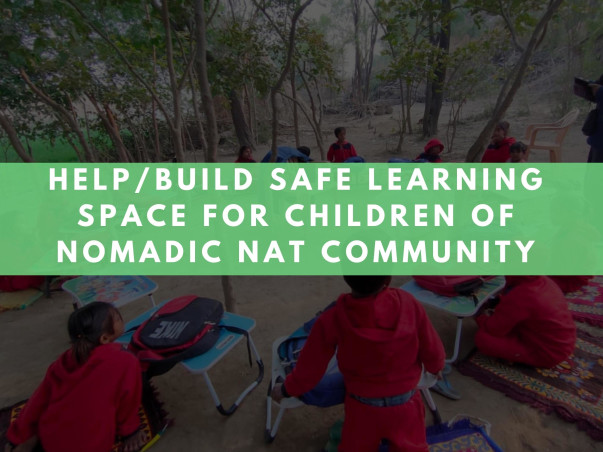Hi Supporters,
Amid the Pandemic, children have been dropping out of school. But there are communities where little girls have had negligible access to education for generations. Vimukta (nomadic) communities in India were criminalized by the British government after the 1857 revolt because these communities’ actively participated in the revolt. The British government introduced a law ‘criminal tribes act 1871’, which pronounced over 200 nomadic (ghumantu) communities as criminal by heredity.
Till date, the communities are facing structural social stigma and caste discrimination. They are labelled as habitual criminals. This discrimination has isolated these communities and kept essential access to resources for dignified living away from vimukta communities. The girl children and women are worst affected.
During our covid-19 ration relief work in 7 villages near Vrindavan (Uttar Pradesh), we came to know about Nat (traditional acrobats) community settlement in village Sakarya. There are approx. 100 families living mostly in mud houses with roofs and beds made of straw. These homes constantly ask for repair mostly done by women.
 Along with immediate support of ration, we started a community learning centre. We call it " Savitri ka Vidya Bagh". 17 children from Vidya Bagh are now enrolled in Orchid Smart School, Vrindavan. They already are a role model for the children in the community.
Along with immediate support of ration, we started a community learning centre. We call it " Savitri ka Vidya Bagh". 17 children from Vidya Bagh are now enrolled in Orchid Smart School, Vrindavan. They already are a role model for the children in the community.
 Vidya Bagh is a place where children from the community gather to learn. It serves as a play school in the morning for children between age 3-6, and in the evening 23 Adolescent out of school girls are learning to read and write so that they can finish their primary education.
Vidya Bagh is a place where children from the community gather to learn. It serves as a play school in the morning for children between age 3-6, and in the evening 23 Adolescent out of school girls are learning to read and write so that they can finish their primary education.
Amid the Pandemic, children have been dropping out of school. But there are communities where little girls have had negligible access to education for generations. Vimukta (nomadic) communities in India were criminalized by the British government after the 1857 revolt because these communities’ actively participated in the revolt. The British government introduced a law ‘criminal tribes act 1871’, which pronounced over 200 nomadic (ghumantu) communities as criminal by heredity.
Till date, the communities are facing structural social stigma and caste discrimination. They are labelled as habitual criminals. This discrimination has isolated these communities and kept essential access to resources for dignified living away from vimukta communities. The girl children and women are worst affected.
During our covid-19 ration relief work in 7 villages near Vrindavan (Uttar Pradesh), we came to know about Nat (traditional acrobats) community settlement in village Sakarya. There are approx. 100 families living mostly in mud houses with roofs and beds made of straw. These homes constantly ask for repair mostly done by women.
 Along with immediate support of ration, we started a community learning centre. We call it " Savitri ka Vidya Bagh". 17 children from Vidya Bagh are now enrolled in Orchid Smart School, Vrindavan. They already are a role model for the children in the community.
Along with immediate support of ration, we started a community learning centre. We call it " Savitri ka Vidya Bagh". 17 children from Vidya Bagh are now enrolled in Orchid Smart School, Vrindavan. They already are a role model for the children in the community. Vidya Bagh is a place where children from the community gather to learn. It serves as a play school in the morning for children between age 3-6, and in the evening 23 Adolescent out of school girls are learning to read and write so that they can finish their primary education.
Vidya Bagh is a place where children from the community gather to learn. It serves as a play school in the morning for children between age 3-6, and in the evening 23 Adolescent out of school girls are learning to read and write so that they can finish their primary education.Help us in creating a space that will be equipped with audio-visual aid, internet educational toys for toddlers, which will help this community to walk along with the mainstream development.
About Nirmal Inititative: We are only organization working on prevention of child sexual abuse along with caste violence against children. We believe in building strong communities to end sexual violence against children and women. We acknowledge the interconnectedness of human existence. Holding this inter-connection as sacred, we can keep each other safe.
As Pandemic affected the mental health of almost every person, the Nirmal initiative is running a mental health first-aid helpline Project Samvedna to provide free mental health counselling to anyone in need. (+91-7300748966)About Nirmal Inititative: We are only organization working on prevention of child sexual abuse along with caste violence against children. We believe in building strong communities to end sexual violence against children and women. We acknowledge the interconnectedness of human existence. Holding this inter-connection as sacred, we can keep each other safe.
Ours is a unique ‘integrated and community-based approach to address sexual violence against children.
We advocate that sexual violence does not take place in a laboratory kind of set-up but in a complex social-cultural arena. We treat it as a socially rooted issue that might be accompanied by other forms of violence (such as bullying, domestic abuse) and structural factors of caste and gender and thus, attempt to address it through the creation of informed and sensitive communities that may release the child from the sole responsibility of saving himself/herself.
Mapping the community sensibilities, intervening with a simplified knowledge to address abuse, and ensuring the creation and maintenance of social accountability is what define our tri-fold modus operandi.
To know more, visit our website https://www.nirmalinitiativetrust.org/







